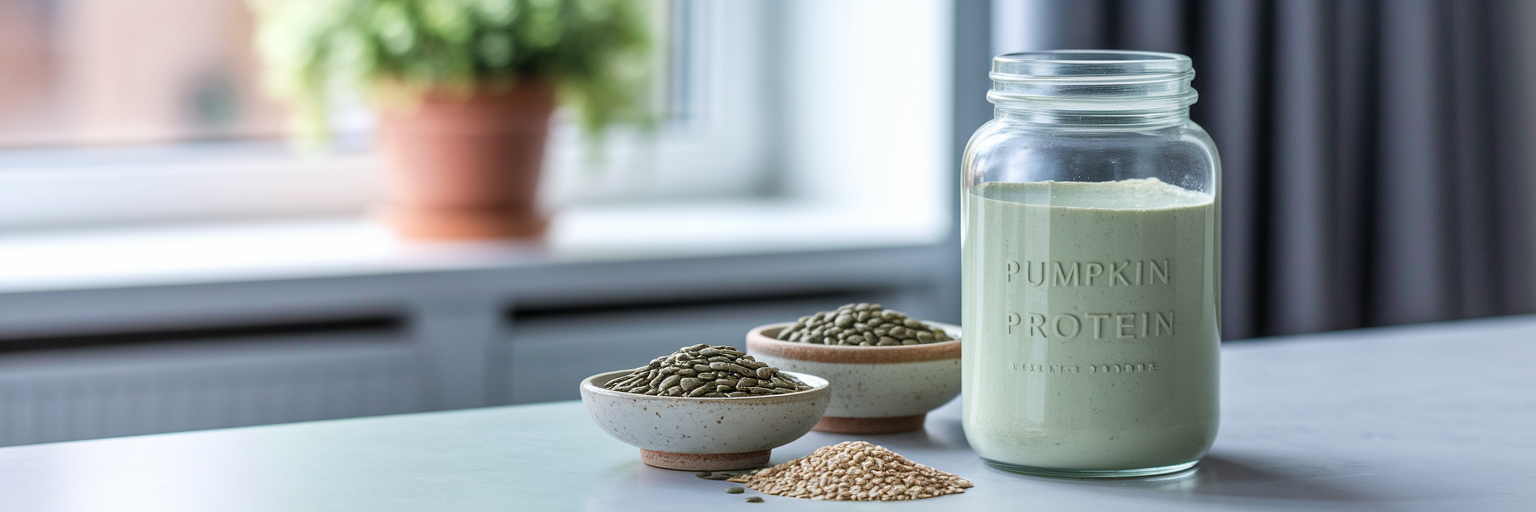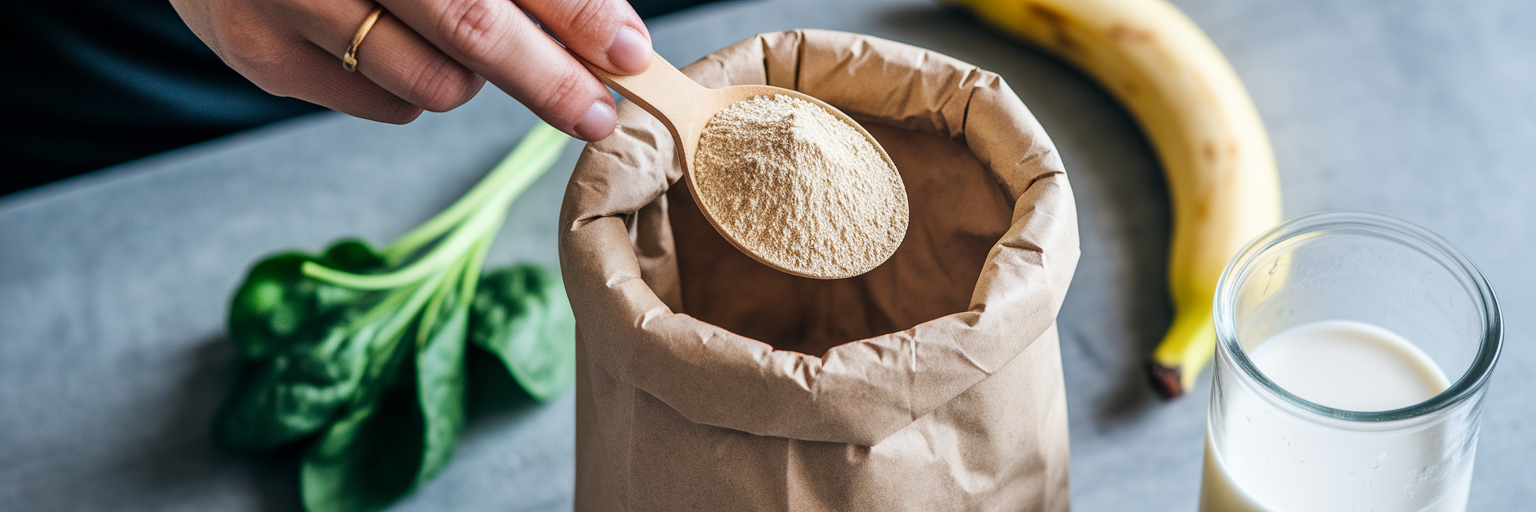You blend a healthy protein shake, drink it down, and then it hits you: that uncomfortable, gassy, and bloated feeling. If this sounds familiar, you are definitely not alone. It’s a common frustration that can make you want to give up on protein supplements altogether. But the problem often isn’t the protein itself, but what’s hiding inside the tub.
Why Your Protein Powder Might Be Upsetting Your Stomach
That post-shake discomfort is your body sending a clear signal. For many, the primary culprits are dairy-based proteins like whey and casein. If you have any degree of lactose intolerance, these can be difficult for your system to process, leading to digestive distress. Other common allergens like soy and gluten can also trigger similar reactions in sensitive individuals.
Beyond the protein source, the ingredient list often reveals other troublemakers. Many powders are loaded with artificial additives that can ferment in your gut. Sugar alcohols like erythritol and xylitol, while calorie-free, are notorious for causing gas and bloating. Artificial sweeteners like sucralose and fillers such as carrageenan or certain gums can also disrupt your digestive harmony, working against your goal of finding a plant based protein without bloating.
It's also worth noting that even some plant-based powders can cause issues. A formula packed with too much fiber or certain gums can be a shock to a system that isn't used to it. Understanding these potential triggers is the first step toward finding a protein powder that works with your body, not against it.
Gentle Plant Proteins Your Gut Will Love

Now for the good news. The plant kingdom offers a fantastic array of powerful and gentle proteins that can help you meet your goals without the digestive drama. These ingredients are naturally free from the most common irritants and bring their own unique nutritional benefits to the table.
Pea protein is a true superstar in this category. It’s a top hypoallergenic choice, naturally free from dairy, soy, and gluten. Plus, it’s packed with iron and branched-chain amino acids (BCAAs) to support muscle recovery and growth. It’s a fantastic foundation for a gentle supplement, which is why it's the star ingredient in our own Chocolate Vegan Protein.
Next up is brown rice protein, another famously easy to digest protein powder. It’s known for being exceptionally gentle on the stomach and is often sprouted to enhance nutrient absorption. When paired with pea protein, it creates a complete amino acid profile, giving you the best of both worlds.
Don’t overlook seed-based proteins. Hemp protein is a nutritional powerhouse, offering a healthy dose of omega-3 and omega-6 fatty acids alongside easily digestible proteins. Pumpkin seed protein is another excellent hypoallergenic protein powder that’s rich in important minerals like magnesium and zinc. These options prove you don’t have to compromise on nutrition to find digestive comfort.
| Protein Source | Key Digestive Benefit | Bonus Nutritional Perk |
|---|---|---|
| Pea Protein | Hypoallergenic and free from dairy, soy, and gluten. | Rich in iron and branched-chain amino acids (BCAAs). |
| Brown Rice Protein | Known for being exceptionally gentle on the stomach. | Often sprouted, which can enhance nutrient absorption. |
| Hemp Protein | Contains easily digestible proteins (edestin and albumin). | Excellent source of omega-3 and omega-6 fatty acids. |
| Pumpkin Seed Protein | A great hypoallergenic option that is less common. | High in valuable minerals like magnesium and zinc. |
This table compares the primary benefits of the most common single-source vegan proteins. Many high-quality powders blend these ingredients to achieve a balanced amino acid profile and maximize nutritional value.
How to Read a Protein Powder Label Like a Pro
Walking down the supplement aisle can feel overwhelming, but knowing what to look for turns confusion into confidence. When it comes to a stomach-friendly protein powder, the philosophy is simple: less is more. Opt for products with short, recognizable ingredient lists. The fewer ingredients there are, the lower the risk of encountering a hidden irritant.
Look for third-party certifications on the label. Seals like "NSF Certified for Sport" or "Informed-Sport" mean an independent organization has verified that the product contains what the label says it does and is free from contaminants. This is a great sign of a brand's commitment to quality and transparency.
Be a detective. Scan for explicit "free-from" claims like "soy-free," "gluten-free," and "dairy-free." On the flip side, be cautious of terms like "proprietary blend." This is often used to hide the exact amounts of each ingredient, making it impossible to know if you're getting a little or a lot of something that might not agree with you. This advice is echoed by institutions like the Mayo Clinic, which cautions consumers to be aware of fillers and artificial ingredients in dietary supplements.
Becoming a savvy supplement shopper is a journey, and if you're curious to learn more, our blog is filled with helpful guides and articles. If you found this guide helpful, share it with a friend who might be struggling with their protein powder!
Key Features of a Stomach-Friendly Protein Powder

When you're on the hunt for the perfect powder, keeping a few key features in mind can make all the difference. Think of this as your checklist for finding the best vegan protein for gut health.
- Single-Source or Simple Blends: Choosing a powder with just one or two main protein sources, like pea or brown rice, makes it much easier to identify what works for your body. If you have a reaction, you'll know exactly what the likely cause is.
- Enzyme-Enhanced Formulas: Look for powders that include added digestive enzymes. Ingredients like protease, amylase, and papain are your gut's best friends. They help your body break down proteins and carbohydrates more efficiently, which can significantly reduce the chance of bloating and gas.
- Unflavored and Unsweetened Options: For the ultimate control, an unflavored powder is your best bet. This allows you to avoid all sweeteners, additives, and even "natural flavors," which can sometimes be a source of irritation. You can then customize the taste yourself with whole foods you know you tolerate well.
Finding a powder that ticks all these boxes is easier when you can explore all our products to see what fits your needs. A clean, simple formula is often the key to happy digestion.
Simple Blending Tips for Easier Digestion
How you prepare your shake can be just as important as the powder you choose. A few simple tweaks can make your protein much easier on your system. Here are some tips for building a better, more digestible smoothie.
- Choose Your Liquid Wisely: Stick with water or gentle, unsweetened plant milks like almond, oat, or coconut milk. Sugary fruit juices can contribute to fermentation and bloating, so it's best to avoid them.
- Add Gut-Friendly Ingredients: Boost your shake's creaminess and nutritional value with gentle additions. Half a banana is a classic for a reason, and a handful of spinach blends in seamlessly. For a pro-tip, try adding steamed-then-frozen zucchini—it creates an incredibly thick texture without adding sugar or flavor. As noted by Harvard Health Publishing, foods like bananas can be beneficial for gut health.
- Start Low and Go Slow: When trying any new vegan protein powder for sensitive stomachs, don't start with a full scoop. Begin with just a half scoop for the first few days. This gives your digestive system time to adapt and can make a huge difference in your overall experience.
Ready to put these tips into action? Once you're ready to get creative, check out these 3 easy vegan protein recipes you'll actually crave for some delicious inspiration.



